Miracle at St. Anna
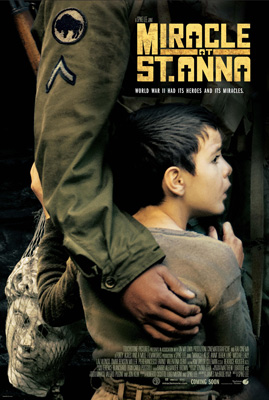
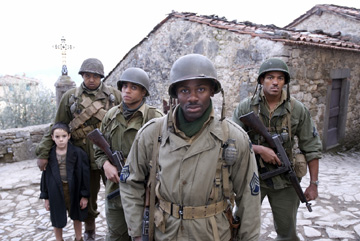 The film's opening moments are set in 1983, where a middle aged black World War II vet named Hector Negron (Laz Alonso) watches a John Wayne war movie before he angrily turns off the TV, and mutters "We were there too, Pilgrim". He goes off to his job at the post office selling stamps, only to have a run-in with a man whom he apparently recognizes. The man barely has time to utter a word before Hector pulls out a hidden German Luger, and blows the guy away. Not stopping to ask how Mr. Negron was able to sneak a Luger into his desk without his boss or fellow employees noticing, we're introduced to a bright eyed young reporter who wants to know the truth behind the shooting, and why Hector has a priceless statue head in his closet that's been reported missing for years. For no conceivable reason, the police allow this reporter to be alone and interview him, and we're brought into a flashback which holds the film's central plot.
The film's opening moments are set in 1983, where a middle aged black World War II vet named Hector Negron (Laz Alonso) watches a John Wayne war movie before he angrily turns off the TV, and mutters "We were there too, Pilgrim". He goes off to his job at the post office selling stamps, only to have a run-in with a man whom he apparently recognizes. The man barely has time to utter a word before Hector pulls out a hidden German Luger, and blows the guy away. Not stopping to ask how Mr. Negron was able to sneak a Luger into his desk without his boss or fellow employees noticing, we're introduced to a bright eyed young reporter who wants to know the truth behind the shooting, and why Hector has a priceless statue head in his closet that's been reported missing for years. For no conceivable reason, the police allow this reporter to be alone and interview him, and we're brought into a flashback which holds the film's central plot.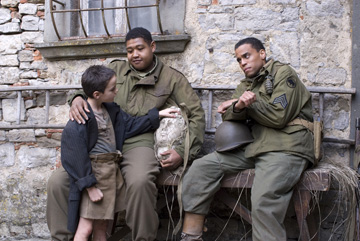 It's now 1944, and we're introduced to a younger Hector Negron and his fellow men of the 92nd Infantry Buffalo Soldiers. Staff Sergeant Aubrey Stamps (Derek Luke), overweight gentle giant Sam Train (Omar Benson Miller), and Sergeant Bishop Cummings (Micheal Ealy) are there with him trapped behind enemy lines. They are trapped in a small village in Tuscany, Italy waiting for help to arrive. As the Germans approach the town, the four men befriend some of the locals, including a young boy (Matteo Sciabordi) whom Train rescued from attack. There's personal rivalries between the men, such as when two of them fall for the same woman in the village, and they sometimes find themselves wondering why they're fighting to protect a country that does not even respect them in the first place.
It's now 1944, and we're introduced to a younger Hector Negron and his fellow men of the 92nd Infantry Buffalo Soldiers. Staff Sergeant Aubrey Stamps (Derek Luke), overweight gentle giant Sam Train (Omar Benson Miller), and Sergeant Bishop Cummings (Micheal Ealy) are there with him trapped behind enemy lines. They are trapped in a small village in Tuscany, Italy waiting for help to arrive. As the Germans approach the town, the four men befriend some of the locals, including a young boy (Matteo Sciabordi) whom Train rescued from attack. There's personal rivalries between the men, such as when two of them fall for the same woman in the village, and they sometimes find themselves wondering why they're fighting to protect a country that does not even respect them in the first place.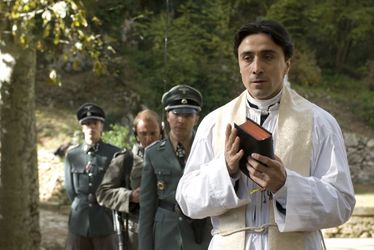 All of this is well and good, but Spike Lee often chooses to hit us over the head with his racial themes. There's a commanding officer who is written simply to be a narrow-minded racist in a completely one-note role and performance. There's dialogue exchanges between the men as they wait for rescue from their fellow officers, where they talk about how they have more freedom in a foreign land than they do in America. That's not to say there is not some effective moments. There's an early scene where the men of the Infantry are making their way toward battle, and over speakers, they can hear Nazi radio propaganda where a woman asks them to join their side, and asks why they fight for a country that treats them as slaves and second class citizens. The looks on the faces of the men listening to the woman's words shows their weakness and how, despite the fact they are fighting for their country, may agree with her in some way.
All of this is well and good, but Spike Lee often chooses to hit us over the head with his racial themes. There's a commanding officer who is written simply to be a narrow-minded racist in a completely one-note role and performance. There's dialogue exchanges between the men as they wait for rescue from their fellow officers, where they talk about how they have more freedom in a foreign land than they do in America. That's not to say there is not some effective moments. There's an early scene where the men of the Infantry are making their way toward battle, and over speakers, they can hear Nazi radio propaganda where a woman asks them to join their side, and asks why they fight for a country that treats them as slaves and second class citizens. The looks on the faces of the men listening to the woman's words shows their weakness and how, despite the fact they are fighting for their country, may agree with her in some way.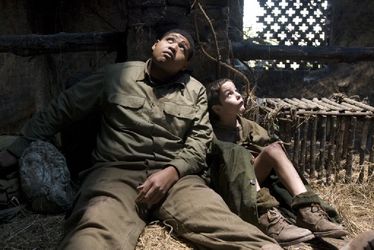 Miracle at St. Anna seems to think it is revolutionary, telling the story of black soldiers in wartime, completely ignoring the fact that the Civil War film from 1989, Glory, pretty much told a similar story and much more memorably. The screenplay by James McBride (who also wrote the novel that the film is based on) never digs deep enough into the characters, or bothers to flesh them out. The men of the Infantry come across as thin caractures, instead of people we can truly get behind. This is surprising, since the movie runs for nearly three hours. You'd think McBride would spend some of that generous time delving into his characters. But no, we get a lot of meandering scenes of the men walking through battlefields, and war scenes that seem to be trying way too hard to emulate the emotion and feeling that Spielberg brought to the battle sequences in Saving Private Ryan, but fall short. It doesn't help that the battles make up maybe 10% of the actual film itself, and are immediately forgettable.
Miracle at St. Anna seems to think it is revolutionary, telling the story of black soldiers in wartime, completely ignoring the fact that the Civil War film from 1989, Glory, pretty much told a similar story and much more memorably. The screenplay by James McBride (who also wrote the novel that the film is based on) never digs deep enough into the characters, or bothers to flesh them out. The men of the Infantry come across as thin caractures, instead of people we can truly get behind. This is surprising, since the movie runs for nearly three hours. You'd think McBride would spend some of that generous time delving into his characters. But no, we get a lot of meandering scenes of the men walking through battlefields, and war scenes that seem to be trying way too hard to emulate the emotion and feeling that Spielberg brought to the battle sequences in Saving Private Ryan, but fall short. It doesn't help that the battles make up maybe 10% of the actual film itself, and are immediately forgettable.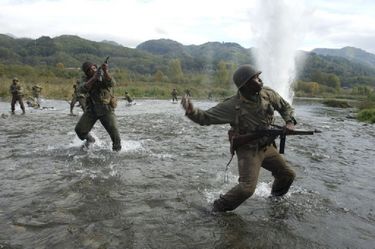 It's been a while since my screening of this film, and I'm still trying to figure out where Spike Lee went wrong. The performances are perfectly acceptable, though no one performance really stands out. And the movie does carry some interesting ideas and themes along with it that should be spellbinding, but never is. I think it's the overall heavy-handedness of the entire production that turned me off. It's almost as if the movie is so afraid we won't understand it or doesn't trust us to figure out its emotional story, so it spells everything out in the dialogue and the previously mentioned music score, which seems to never take a rest, and constantly bangs us over the head. Instead of spending so much time worrying if we would be smart enough to understand it, the movie should have spent its time developing a more interesting narrative that could have engaged us.
It's been a while since my screening of this film, and I'm still trying to figure out where Spike Lee went wrong. The performances are perfectly acceptable, though no one performance really stands out. And the movie does carry some interesting ideas and themes along with it that should be spellbinding, but never is. I think it's the overall heavy-handedness of the entire production that turned me off. It's almost as if the movie is so afraid we won't understand it or doesn't trust us to figure out its emotional story, so it spells everything out in the dialogue and the previously mentioned music score, which seems to never take a rest, and constantly bangs us over the head. Instead of spending so much time worrying if we would be smart enough to understand it, the movie should have spent its time developing a more interesting narrative that could have engaged us.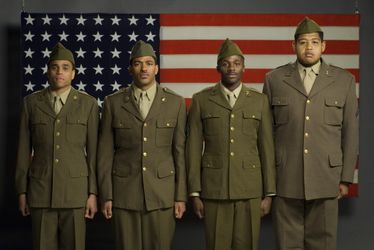
See the movie times in your area or buy the DVD at Amazon.com!






0 Comments:
Post a Comment
<< Home